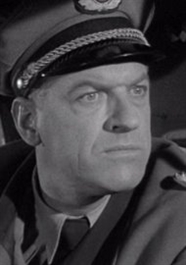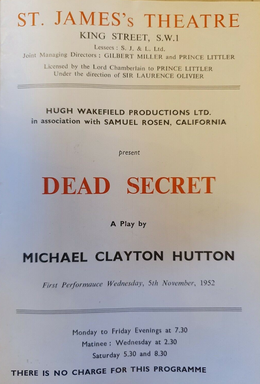Related Research Articles

Robert Guy Newton was an English actor. Along with Errol Flynn, Newton was one of the more popular actors among the male juvenile audience of the 1940s and early 1950s, especially with British boys. Known for his hard-living life, he was cited as a role model by the actor Oliver Reed and the Who's drummer Keith Moon.

Glyndwr Desmond Houston was a Welsh actor best known for his television work. He was the younger brother of film actor Donald Houston.

Hugh Anthony Glanmor Williams was a British actor and dramatist of Welsh descent.

John Michael Terence Wellesley Denison was an English actor. He often appeared with his wife, Dulcie Gray, with whom he featured in several films and more than 100 West End theatre productions.

Benjamin Arthur Flemyng, known professionally as Robert Flemyng, was a British actor. The son of a doctor, and originally intended for a medical career, Flemyng learned his stagecraft in provincial repertory theatre. In 1935 he appeared in a leading role in the West End, and the following year had his first major success, in Terence Rattigan's comedy French Without Tears. Between then and the Second World War he appeared in London and New York in a succession of comedies.

Peter Copley was an English television, film and stage actor.

Robert Urquhart was a Scottish character actor who worked on the stage, for British television, and in film. His breakthrough role was Paul Krempe in The Curse of Frankenstein in 1957, along with Peter Cushing and Christopher Lee.

Frank Lawton Mokeley was an English actor.

The Happy Family is a 1952 British comedy film directed by Muriel Box and starring Stanley Holloway, Kathleen Harrison and Naunton Wayne. The plot of the film centres on resistance by a family to the disruption caused by the construction of the Festival of Britain. It is also known in the U.S. by the alternative title Mr. Lord Says No. It was an adaptation of a play The Happy Family by Michael Clayton Hutton.

Tom Gill was a British actor who was born in Newcastle upon Tyne, Northumberland, England. He made his stage debut in 1935, and his theatre work included the original production of Noël Coward's After the Ball at the Globe Theatre in 1954. In 1951 he appeared at the Duchess Theatre in London's West End in the comedy play The Happy Family by Michael Clayton Hutton and reprised his role in the subsequent film adaptation.

Charles McEvoy (1879–1929) was a British playwright and stage director. He was originally a journalist before switching to creative writing in 1907, becoming known for his realism. His 1923 play The Likes of Her was adapted into a 1931 film Sally in Our Alley. His brother was the artist Ambrose McEvoy.

The Holly and the Ivy is a 1950 play by the British writer Wynyard Browne. A vicar attempts to deal with the various problems of his family as they gather for the Christmas period.

His Excellency is a 1950 play by the British writers Campbell Christie and Dorothy Christie. A former docker takes over as the British governor of an island colony in the Mediterranean.

The Gentle Gunman is a 1950 thriller play by the British writer Roger MacDougall. A former IRA gunman attempts to renounce his violent past, as he is now convinced a non-violent approach is best.
Peter Blackmore (1909–1984) was a British playwright and screenwriter. His play Miranda was adapted into the 1948 film of the same title. He also wrote the comedy play The Blue Goose which appeared in the West End in 1941. His 1953 play Down Came a Blackbird ran for 53 performances at the Savoy Theatre. He worked on the screenplays for a number of comedy films for British Lion and the Rank Organisation, including two Norman Wisdom vehicles.

Silver Wedding is a 1957 comedy play by the British author Michael Clayton Hutton. First performed four years after the author's death, it premiered at the Opera House, Manchester before transferring to London's West End where it ran for 158 performances between 9 July and 23 November 1957 initially at the Cambridge Theatre before transferring to the Winter Garden Theatre. The West End cast included Evelyn Laye, Frank Lawton, Marie Lohr, Miranda Connell and Catherine Boyle.

Dead Secret is a 1952 thriller play by the British writher Michael Clayton Hutton. A murder mystery, it premiered at Her Majesty's Theatre, Brighton before transferring to London's West End where it ran for 29 performances at St James's Theatre between 5 November and 29 November 1952. The West End cast featured Ian Hunter, Hugh Wakefield, Joyce Heron and Sophie Stewart.

The River Line is a 1952 stage play by the British writer Charles Langbridge Morgan, based on his own 1949 novel of the same title. It premiered at the Manchester Opera House before transferring to the Lyric Theatre in Hammersmith and then the Strand Theatre in London's West End. Its combined London run at the Lyric and the Strand lasted for 205 performances between 2 September 1952 and 7 March 1953. The London cast featured Paul Scofield, Phil Brown, Michael Goodliffe, John Westbrook, Robert Hardy, Marcel Poncin, Pamela Brown, Marjorie Fielding and Virginia McKenna.
The Happy Family is a 1951 comedy play by the British writer Michael Clayton Hutton. It premiered at the Embassy Theatre in Hampstead. It then transferred to the Duchess Theatre in London's West End where it ran for 64 performances from 14 June 1951. The West End cast included Henry Kendall, Thora Hird, Dandy Nichols, Digby Wolfe, Glyn Houston, Peter Copley and Tom Gill.

Power Without Glory is a 1947 crime play by the British writer Michael Clayton Hutton. It first appeared at the New Lindsey Theatre in Notting Hill before transferring to the Fortune Theatre in London's West End where it ran for 73 performances between 5 April and 7 June 1947. The West End cast included Dirk Bogarde, Kenneth More, Maureen Pryor, Beatrice Varley and Dandy Nichols. It was filmed by the BBC the same year with the original cast. His appearance in the play brought Bogarde to the attention of filmmakers. Both he and More would go on to become stars of the Rank Organisation. It was staged at the Booth Theatre on Broadway in early 1948 with a different cast, lasting for 31 performances.